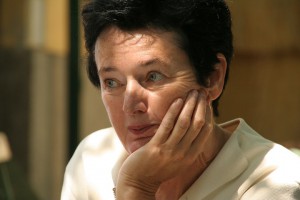Ina Wagner has made a transition from physics (she holds a PhD in nuclear physics) to anchoring her research in CSCW (Computer Supported Cooperative Work) and PD (Participatory Design). After completing her PhD thesis, she worked on a Habilitation project in the field of science education, from a sociology of knowledge perspective, and was awarded her first Habilitation by the University of Klagenfurt in 1979 (Gelehrte Erfahrung. Zu einer Theorie der Curriculuminnovation. Frankfurt: Campus, 1979). In the period 1983-85 she acted as Chair of the Austrian Sociological Society. 1987 she was offered a professorship at TUW in ‘Computers and Society’, which she transformed into an interdisciplinary research unit. In 1998 she was awarded an Extended Habilitation in ‘Multidisciplinary Design and CSCW’ by TUW. In 1989 she was offered a Department Directorship at the Science Center in Berlin, in 1991 a Chair in Sociology of Industrial Societies at Johann-Wolfgang-Goethe University Frankfurt, both of which she declined. 1990-1991 she held an Endowed Chair in Interdisciplinary Studies at the Technische Hochschule Darmstadt.
Ina Wagner’s scientific career has been based on interdisciplinarity from the outset. Her major intellectual project is to achieve a deeper understanding of (collaborative) work practices and technology use in fields as varied as health care, architecture and urban planning, and other professional contexts. As diverse as her research topics may appear, they have a common focus on work practices in different professional and organizational contexts. She was among the first to bring health care to the attention of CSCW research, with a monograph ‘Das computerisierte Krankenhaus’ (1991), followed by a series of projects and peer reviewed journal papers on nursing and computer technologies (based on field studies in Austria and France); on time planning in a surgical clinic; on the introduction of PACS (digital imaging and archiving technologies) in radiology (with a focus on spatial relationships in work settings); and on the variations of work practices and artefacts in several oncology clinics in Austria, with a view onto understanding the tensions between local work practices and global concerns.She also has made salient contributions to the understanding of architectural practice, based on twelve years of fieldwork, where she studied architecture in ‘real settings’. In her fieldwork, which includes software development and product development in the car industry, she examines the sources of complexity in different work contexts, the logics of cooperative practices, and the coordinative artifacts practitioners develop.
Gender has been an important research topics in her work. Starting with explorations of epistemological questions connected to gender and science, she carried out one of the first studies of office automation world-wide, followed by research on women in unskilled occupations, in health care with a focus on nursing, in architecture, in the financial services, in multimedia companies, and in the computing professions, using ethnographic observation and biographical interviews as methods. Her most research contribution to a feminist and intersectional perspective on design is the book Gender and Technology At Work: From Workplace Studies to Social Justice in Design (with Ellen Balka, Anne Weibert and Volker Wulf), Cambridge UP (in Press).
Ina Wagner engaged early on in analyzing ethical and political aspects of ICT, with a focus on medical technologies, as member of the ‘Forum Information Society’, European Commission (1996-1998), as member of the European Group on Ethics in Science and New Technologies (EGE), European Commission (1998-2001), and as member of the National Austrian Bioethics Committee (BEK)(since 2001), where she has contributed to numerous opinions (recently ‘Robots in the care of older people’ (2018) and ‘The work of physicians at the interface of big data, artificial intelligence and human experience’ (2020)). In 2020 she wrote an expert report ‘Integrating a gender equality perspective’ for the Committee on Bioethics (DH-BIO) on Human rights in biomedicine of the Council of Europe.
Much of Ina Wagner’s research has been embedded in the context of EU funded technology development projects. This allowed her to immerse herself in experimental, creative, and participatory practices, directed at bridging the social worlds of practitioners and those of engineers, with a focus on understanding use situations of technologies and their appropriation by practitioners. The mixed-reality technologies, which were developed by Ina Wagner’s research team in the context of EU project IPCity was selected to be shown at the European City of Science exhibition in the Grand Palais, Paris (Nov 14-16, 2008). With Tone Bratteteig, University of Oslo, she has written a number of publications, including ‘Disentangling Participation: Power and Decision-Making in Participatory Design’ (Springer, 2014), with a focus on power decision-making in design as key to understanding participation in design.

